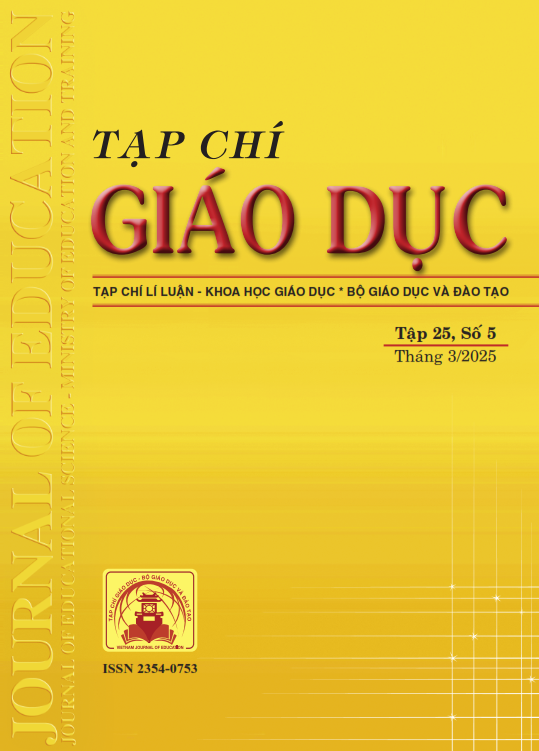Kinh nghiệm quốc tế về quản trị giáo dục phổ thông tư thục trong cuộc Cách mạng công nghiệp 4.0 và một số đề xuất cho Việt Nam
Tóm tắt
The Fourth Industrial Revolution, with the integration of advanced technologies such as Artificial Intelligence (AI), Big Data, and Learning Management Systems (LMS), has brought out transformative changes to education. The article analyzes international experiences in the governance of private education in the context of the Fourth Industrial Revolution, drawing lessons and proposing solutions for Vietnam. Developed countries such as the United States, South Korea, Singapore, Finland, and China have successfully leveraged these technologies to enhance governance efficiency and improve educational quality. However, in Vietnam, private schools are facing challenges related to digital infrastructure, human resource capacity, and inconsistent support policies. The article employs a combination of theoretical reviews and comparative analysis utilizing scientific literature, international reports, and empirical studies to provide a comprehensive and systematic perspective. The proposed solutions include investing in digital infrastructure, enhancing the capacity of human resources, establishing clear policies and legal frameworks, integrating technology into governance and teaching, and fostering international cooperation. These solutions aim to modernize the private education system, improve quality and operational efficiency, and meet diverse demands in the digital era.
Tài liệu tham khảo
Aoun, J. E. (2017). Robot-proof: Higher education in the age of artificial intelligence. MIT Press.
Baek, Y., Lee, S., & Kim, B. (2021). Digital transformation in Korean education: Current status and future challenges. Educational Technology & Society, 24(1), 59-70.
Brynjolfsson, E., & McAfee, A. (2017). Machine, platform, crowd: Harnessing our digital future. W. W. Norton & Company.
Bùi Thị Diển, Đặng Thị Thu Huệ, Vương Quốc Anh, Đỗ Thu Hà, Nguyễn Thanh Trịnh. (2022). Nghiên cứu đề xuất mô hình giáo dục thích ứng cho giáo dục phổ thông Việt Nam. Tạp chí Khoa học Giáo dục Việt Nam, 18(2), 14-22.
Johnson, L., Adams Becker, S., Estrada, V., & Freeman, A. (2016). NMC Horizon Report: 2016 Higher Education Edition. The New Media Consortium.
Kim, M. (2019). Smart education in South Korea: Current issues and future directions. Educational Technology Research and Development, 67(2), 225-245.
Lê Văn Một (2021). Chuyển đổi số trong lĩnh vực giáo dục và đào tạo ở Việt Nam: Thực trạng và giải pháp. Tạp chí Kinh doanh và Công nghệ, 13, 64-70.
Le, A. V., Luong, M. P., Do, D. L., Tran, M. N., & Bui, T. D. (2023). Technology in education: A case study on Vietnam. Background paper prepared for the 2023 Global Education Monitoring Report: Technology and education, Southeast Asia (Vol. 17). https://doi.org/10.54676/GPDF6007
Le, P., & Tran, Q. (2022). The challenges of digital transformation in private education management in Vietnam. Journal of Educational Technology, 15(2), 45-60.
Lim, C. P. (2018). Technology-enabled learning in Singapore: Trends and challenges. Educational Technology, 58(2), 45-54.
Luckin, R., Holmes, W., Griffiths, M., & Forcier, L. B. (2016). Intelligence unleashed: An argument for AI in education. Pearson.
Nguyễn Thị Hương (2019). Quản trị trường học đáp ứng yêu cầu đổi mới giáo dục phổ thông, vận dụng kiến thức trong thời kì cuộc Cách mạng công nghiệp 4.0. Tạp chí Khoa học Giáo dục Việt Nam, 16, 13-18.
Nguyễn Văn Cao (2020). Quản lí trường trung học phổ thông ngoài công lập ở Hà Nội trong giai đoạn hiện nay. Luận án tiến sĩ Quản lí giáo dục, Viện Khoa học Giáo dục Việt Nam.
Nguyen, T. M. (2021). Digital governance in Vietnamese secondary education: Problems and prospects. Vietnam Educational Review, 13(4), 67-82.
OECD (2019). Education at a glance 2019: OECD indicators. OECD Publishing.
OECD (2020). Education in the digital age: Evidence from industrialized countries. OECD Publishing.
Sahlberg, P. (2015). Finnish lessons 2.0: What can the world learn from educational change in Finland? Teachers College Press.
Schwab, K. (2016). The Fourth Industrial Revolution. Crown Business.
Teo, T. S. H., Kim, S. L., & Jiang, L. (2020). E-learning implementation in South Korea: Integrating effectiveness and legitimacy perspectives. Information Systems Frontiers, 22(2), 511-528.
Trần Mai Phương (2020). Quản trị trường trung học cơ sở ngoài công lập trên địa bàn thành phố Hà Nội trong bối cảnh hiện nay. Luận án tiến sĩ Quản lí giáo dục, Học viện Quản lí Giáo dục.
Trịnh Thị Anh Hoa (2021). Định hướng chiến lược chuyển đổi số trong giáo dục đáp ứng yêu cầu Cách mạng công nghiệp 4.0. Tạp chí Khoa học Giáo dục Việt Nam, số đặc biệt, 15-20.
Tuomi, I. (2018). The impact of artificial intelligence on learning, teaching, and education. Publications Office of the European Union. https://doi.org/10.2760/12297
UNESCO (2020). Education in a post-COVID world: Nine ideas for public action. UNESCO Publishing.
Vũ Đức Quảng (2024). Ảnh hưởng của cơ sở hạ tầng công nghệ thông tin đến hiệu quả giáo dục cho người dân tộc thiểu số khu vực miền Trung - Tây Nguyên. Tạp chí Giáo dục, 23(số đặc biệt 10), 198-201.
Watson, W. R., & Watson, S. L. (2007). An argument for clarity: What are learning management systems, what are they not, and what should they become? TechTrends, 51(2), 28-34. https://doi.org/10.1007/s11528-007-0023-y
World Bank (2021). Transforming education for the digital age. World Bank Group.
Zhang, X., Sun, J., & Liu, Y. (2020). Educational transformation in China: Integrating AI and Big Data into teaching and learning. Journal of Educational Change, 21(3), 467-482.
Tải xuống
Đã Xuất bản
Cách trích dẫn
Số
Chuyên mục
Giấy phép

Tác phẩm này được cấp phép theo Ghi nhận tác giả của Creative Commons Giấy phép quốc tế 4.0 .












